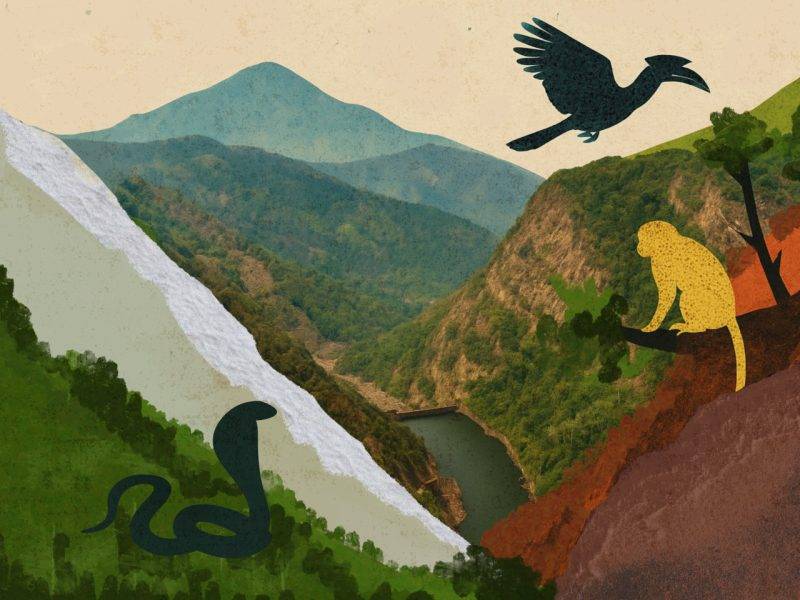An Environmental Disaster in the Western Ghats? Sharavathi Pumped Storage Project

Details
Sep 10 2025 to Sep 10 2025 6:30 p.m.
EVENT HAS ENDED
Where
Bangalore International Centre
7 4th Main Rd, Stage 2, Domlur 560071
Event Description
The proposed Sharavathi Valley Pumped Storage Project (PSP) in Karnataka’s Western Ghats seeks to generate 2,000 MW of peak power by cycling water between reservoirs. Positioned as a solution for renewable energy integration, the project would require clearing over 400 acres of pristine evergreen forest within protected wildlife sanctuaries,
threatening endangered species like the Lion-Tailed Macaque and other vulnerable species such as the Malabar Pied Hornbill and King Cobra. Experts from IISc have called it an “illogical doomsday path,” highlighting irreversible biodiversity loss, fragmentation, and risks of landslides in this ecologically fragile and rainfall-prone terrain.
The talk will critically examine the project’s environmental governance, including contradictions in presenting pumped storage as a climate solution. It will also scrutinise the government’s Environmental Impact Assessment, which underpins approvals despite evidence of ecological harm and violations of forest and wildlife laws. Financial analyses further indicate that the project’s societal costs may exceed its benefits.
In this session Nirmala Gowda And Shankar Sharma will reflect on whether projects like the Sharavathi PSP genuinely advance energy security, or compromise it by eroding biodiversity, climate resilience, and community welfare. This will be followed by a Q&A session with the audience.
Speakers
Nirmala Gowda
Activist & Researcher
Nirmala Gowda is an activist–researcher working on water and river issues. She is the founder and editor of MappingMalnad.com. She previously co-founded and curated Paani.Earth.
Her work spans legal advocacy, grassroots collaborations, and independent research on rivers, forests, and mountains—from the Malnad to the Maidan. She has been critically examining energy projects promoted as climate solutions, including pumped storage projects in the fragile Western Ghats and sugarcane-based ethanol (flex-fuel) expansion in the water stressed Cauvery basin. She has also worked extensively on the pollution of Bellandur and Byramangala lakes, as well as on industrial pollution affecting the Vrishabhavathi and Arkavathi rivers—particularly from hazardous waste landfills, tyre factories, and other industries in Bengaluru and Ramanagara—through Paani.Earth and the Bangalore Environment Trust. Her work also extends internationally, where she is engaged in a project with IHE Delft, Netherlands, on the Athi River in Kenya.
With a degree in computer science engineering, she worked with IT and pharmaceutical companies in the U.S. before transitioning to environmental work. She holds an M.Sc. in Environmental Management from the University of San Francisco.
MappingMalnad.com
Shankar Sharma
Power & Climate Policy Analyst
Shankar Sharma is a Power and Climate Policy Analyst with over four decades of experience in the electricity sector across India, Australia, and New Zealand. An electrical engineer with a postgraduate diploma in Technology Management, he has worked with utilities, government agencies, and consulting firms in generation, transmission, and distribution. Since 2004, Shankar has been deeply engaged with NGOs, academic institutions, and civil society groups on power sector reforms, renewable energy, biodiversity conservation, and climate change mitigation. He is the author of Power Sector Road Map for Tamil Nadu – 2050 and Integrated Power Policy, and has contributed reports for Greenpeace India and the Karnataka State Pollution Control Board. A graded commentator and prolific writer, his articles on sustainable energy and climate policy have appeared widely in journals and media. Shankar continues to advocate for environmentally responsible, people-centric energy strategies.
Sharavati Valley PSP and Alternatives















